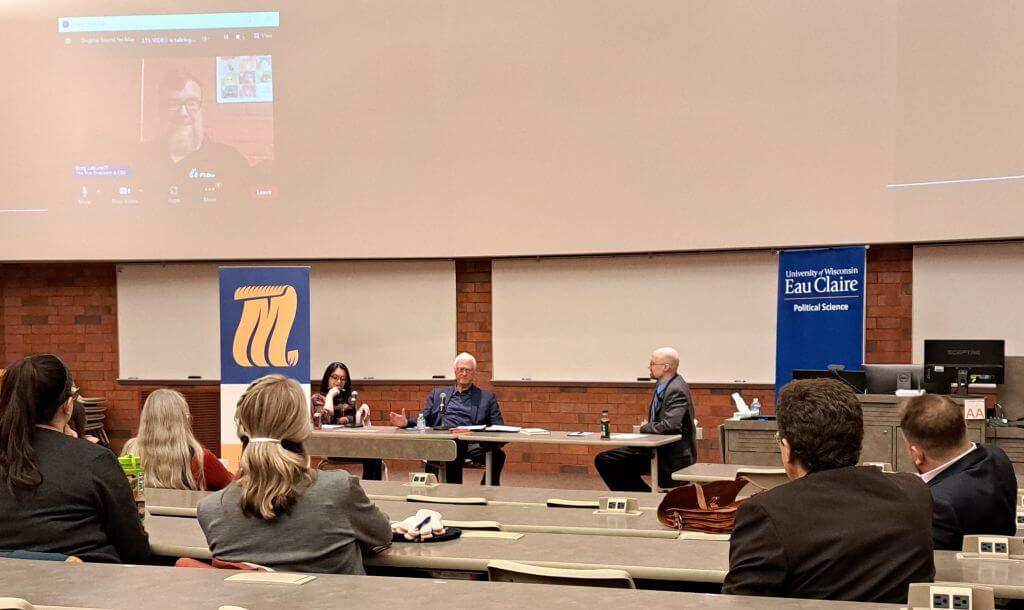Future of Free Speech on Campus Panel at UWEC
May 8th, 2023

On Monday, May 1st, the Menard Center for Constitutional Studies held a panel on the Future of Free Speech on Campus. Speakers Donald Downs, professor emeritus at UW-Madison, and Amna Khalid, associate professor at Carleton College attended the event in person, while Greg Lukianoff, the President and CEO of the Foundation for Individual Rights and Expression (FIRE), attended virtually.
The Current State of Free Speech
All speakers agreed that the state of free speech is the worst it has been in years, and the pressure for censorship is coming from both inside and outside of universities. Outside pressure comes primarily from state legislatures. Khalid mentioned we can see this most clearly with the current actions Florida is pursuing to curb free speech.
Lukianoff further expanded by saying Fire is seeing more demand coming from within universities for censorship. When he joined FIRE in 2001, many demands against free speech originated from the administration, but around 2013-2014, he started to see demands coming from students. Now, he sees a huge push from students on what speech should not be allowed on campus.
The Role of Social Media
One of the factors that is causing this push for free speech to be curtailed is social media. Lukianoff believes that social media is the reason why attempts to curb speech have grown. He compared the invention of social media to the invention of the printing press. Both caused a lot of problems in the short term because they allowed a lot of ideas and speech to be shared, and there were a lot of legal unknowns. He is optimistic though that in time, we as a society can adapt, and learn how to use social media for good.
Khalid pointed out that social media can increase peer pressure. Many students are worried about what their peers think about them outside of class, and social media makes this fear worse. Social media also can make a small minority appear much bigger than it truly is, adding to that pressure.
Downs said the introduction of social media and computers has made it much harder to teach students. With computers and phones in class, professors have to compete with social media for students’ attention. The constant bombardment of information on social media also makes it hard for students to learn how to think critically. Instead of taking the time to come to their own conclusion, students are agreeing with what they see presented on social media.
What Can Be Done
There is hope though, as all speakers said there are steps that can be taken to promote free speech.
Khalid said it is important to break the cycle of reactions. Feeling emotional about something is not a bad thing, it shows that you care and have opinions about a topic. She stressed though that what is bad, is when these emotions are acted upon without reflection. Emotions should be a starting point for reflection to think about why you reacted the way you did.
Downs recommended rallying around those impacted by hate speech, and not attacking who said the speech. If people don’t feel they are supported, they will go to the state legislature to get support, and when people turn to the state legislature, it creates more outside pressure to curb free speech.
All speakers also believe that there are more universities can do to educate students about free speech. Lukianoff thinks there need to be more listening programs during orientation, where students learn how to listen to different ideas and be exposed to them.
Khalid said there need to be changes in the education students get about free speech. Students are often told what they cannot say, but not the importance of free speech. By learning about the history of free speech in a global context, she hopes that students would better understand why free speech is so important.
More information:
Menard Center for Constitutional Studies
UW-Madison can’t punish student for racist video, expert says (The Cap Times)
Posted by Emily Johnston Governmental Affairs Intern
johnston@eauclairechamber.org